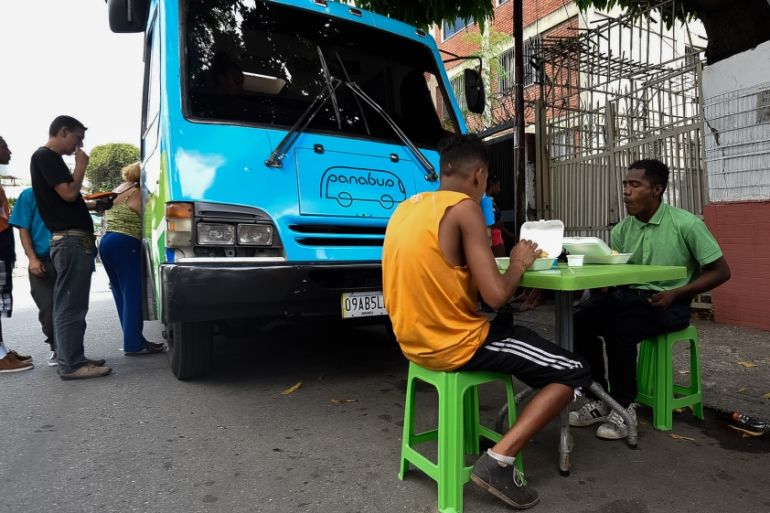‘Failed state’: Venezuelan displacement and starvation multiply
Less than a decade after major strides addressed malnourishment, Caracas now faces massive refugee and hunger crises.

Even on a continent filled with countries that have a history of violent conflicts, the recent displacement of people from Venezuela is the largest that Latin America has ever seen.
Mass migration from the deeply troubled South American society is being caused by an unprecedented economic and humanitarian crisis.
Keep reading
list of 4 itemsWhy Egypt backed South Africa’s genocide case against Israel in the ICJ
US sanctions two RSF commanders as fighting escalates in Sudan’s Darfur
Israel’s war on Gaza updates: 600k displaced from Gaza since May 6 – UN
Hitting a new low of desperation, Venezuelans are now fleeing the country due to hunger, according to the latest figures released by the Food and Agriculture Organization (FAO) and other United Nations agencies.
Starvation in Venezuela is on the rise, according to an FAO report on food security and nutrition published last month. Malnourishment there surged sevenfold, from three percent in 2010 to 21 percent last year.
Venezuela is in the midst of political upheaval, with China, Russia and the United States taking positions that will shape the future of the country. Washington is looking to depose the government of Venezuelan President Nicolas Maduro, while Beijing and Moscow are providing capital to shore up the country’s finances.
Yet as the world’s superpowers play tug-of-war, the situation is getting worse on the ground.
“We are ceasing to be a country, and becoming a failed state,” Antonio Ledezma, the former mayor of Caracas who now lives in exile in Spain, told Al Jazeera.
Alberto Schlesinger, dean of the economics faculty at Sergio Arboleda University in Bogota, Colombia, also says that Venezuela is experiencing a full-on catastrophe.
“Hunger, malnutrition, rampant insecurity and diseases of all kinds are destroying an entire nation,” he told Al Jazeera.
But Schlesinger said Venezuelans were not the only ones at fault for what is going on in his neighbouring country. “The international community is responsible for this disaster,” he said.
“It was permissive and indolent with [former President Hugo] Chavez, especially during the oil bonanza – definitely contributing to the creation of what we have today. With Maduro, the international community has been weak,” Schlesinger said.
“And by not using the necessary forceful measures, it has allowed the regime to be successful in its strategy of procrastination and deception.”
‘Flee in time’
FAO data show how bad things have gotten. Ironically, the Maduro government was recognised by the UN in 2013 and in 2015 for its work reducing hunger.
“Today we received the recognition of the FAO for the Food Mission, an achievement of the Revolution, Chavez, and the People,” tweeted Maduro on June 8, 2015.
The food mission is a programme created by the socialist government of Hugo Chavez – and continued by Maduro – to fight hunger. But now, it is failing.
The FAO says Venezuela now ranks second in the hemisphere in terms of malnourishment, with 21.2 percent of the population (6.8 million people) suffering from hunger. Venezuela is behind only Haiti, where 49.3 percent of the population lacks sufficient food.
Overall, the rate of hunger in Latin America is 6.5 percent, and in South America specifically, the figure is 5.4 percent, despite the Venezuelan crisis.
Lorent Saleh, a human rights activist and winner of the 2017 Sakharov Prize issued by the European Parliament for freedom of thought, told Al Jazeera that conditions are brutal.
“Those who are in Venezuela do not live,” Saleh said. “Some survive, others try to flee in time.”
Like Ledezma, Saleh also lives in Madrid. He was exiled by Maduro’s government – deported from his own country – after being held without trial for more than four years.
Saleh says that Russia, Cuba and China have helped Maduro’s regime create the perfect recipe for a humanitarian crisis and that food shortages are now frequent.
‘Some people eat dog food’
Negotiations between Maduro’s regime and the opposition – based in Barbados – are stalled.
People unable to escape the country are increasingly dependent on remittances from abroad, and even those with some funds often cannot find bread, milk and eggs in any one of the country’s shops.
Some are left to barter on the streets or by setting up trades on the free WhatsApp messaging platform.
Venezuela’s currency, the bolivar, is almost out of paper circulation. Wire transfers between accounts abroad or transactions on payment networks like Zelle or PayPal have replaced notes and coins.
“Remittances are increasingly representing a source of livelihood for Venezuelan families,” said Armando Armas, a member of the National Assembly for the state of Anzoategui.
“Many Venezuelans decide to emigrate and send remittances to their families in Venezuela,” he added. “The economy in Venezuela is a dollarised one.”
With bolivars scarce and bartering impractical, some Venezuelans opt for any available sustenance. Many have resorted to eating pet food, said Vanessa Vallejo, a political analyst taking the pulse of the region.
“There are Venezuelans cooking with firewood in the streets,” she told Al Jazeera.
“Some people eat dog food, others even eat stray dogs, or look for food in the trash. People are dying of hunger and diseases that in any other country except Venezuela can be easily cured, because there are no basic medicines,” Vallejo said.
Estimates of the number of displaced people from Venezuela vary between three and five million. But that number looks set to rise in the future, as hunger pains grow from Caracas near the sea to the rural hinterlands.